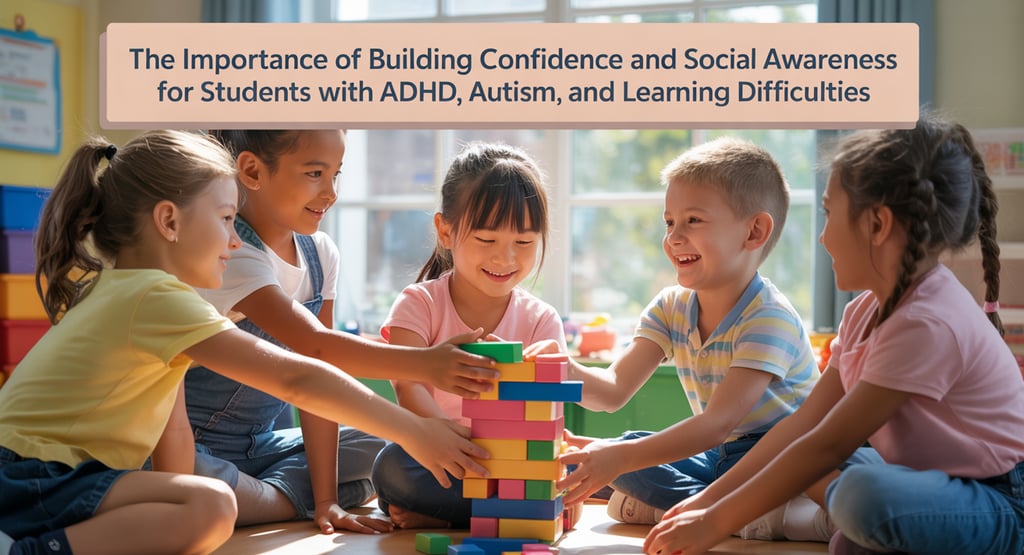SEN Specialists : Special Needs Tutors | GCSE - IGCSE Tuition |
The Importance of Building Confidence and Social Awareness for Students with ADHD, Autism, and Learning Difficulties
In my work with students who have ADHD, autism, and other learning difficulties, I’ve seen a common thread: academic progress is often closely tied to a child’s emotional and social development.
James


In my work with students who have ADHD, autism, and other learning difficulties, I’ve seen a common thread: academic progress is often closely tied to a child’s emotional and social development. While it’s natural for parents and educators to focus on reading, writing, and math, helping students develop confidence, reduce anxiety, and build self-awareness and social skills is just as important—sometimes even more so—than academic instruction alone.
The Foundation: Confidence and Self-Esteem
Many students with learning differences have experienced setbacks or misunderstandings in traditional classroom settings. These experiences can chip away at their confidence and self-esteem, making them hesitant to try new things or take academic risks. Before meaningful learning can take place, it’s essential to help students rebuild their sense of self-worth. When a child feels capable and valued, they are much more likely to engage with academic material and persevere through challenges.
Reducing Anxiety
Anxiety is a frequent companion for students with ADHD, autism, and learning difficulties. Worries about making mistakes, being misunderstood, or not fitting in can create a mental barrier to learning. Addressing anxiety—through supportive relationships, predictable routines, and explicit teaching of coping strategies—can free up mental energy for academic growth. Students who feel safe and supported are more willing to participate, ask questions, and take on new challenges.
Self-Awareness and Social Awareness
Self-awareness helps students recognize their strengths and areas for growth, while social awareness allows them to understand and navigate interactions with others. Both are crucial for success in and out of the classroom. For students with learning differences, these skills often need to be taught explicitly. When students understand themselves and others, they are better equipped to advocate for their needs, collaborate with peers, and manage social situations that might otherwise feel overwhelming.
The Role of Mentoring, Coaching, and Tutoring
Mentoring and coaching provide a bridge between emotional development and academic achievement. A mentor, coach, or SEN specialist can offer guidance, encouragement, and practical strategies tailored to each student’s unique profile. This relationship can help students set realistic goals, celebrate progress, and develop resilience. Regular check-ins with a trusted adult can make a significant difference in a student’s motivation and outlook.
How SENSpecialists Can Help?
At SENSpecialists, we understand the importance of supporting students beyond academics. Our team of experienced tutors and SEN practitioners work with students to build confidence, reduce anxiety, and develop self-awareness and social skills alongside academic learning. We tailor our approach to each child’s needs, providing mentoring, coaching, and practical strategies that help students thrive both in and out of the classroom. By focusing on these foundational skills, we help lay the groundwork for meaningful academic achievement and personal growth.
Why This Matters?
Academic success is about more than grades or test scores. For students with ADHD, autism, and learning difficulties, it’s about building the confidence to try, the resilience to keep going, and the social skills to connect with others. By prioritizing emotional and social development—through mentoring, coaching, and specialized support—we give students the tools they need to thrive, both in school and beyond. If you’re a parent or educator, consider how you can support these foundational skills in your students. Progress in these areas is often the first step toward meaningful academic achievement.
About
Tailored educational support for unique learning needs in Singapore, UK, Malaysia, Philippines, Indonesia, Thailand, Laos, Cambodia & China.
EDUCATION FOR HEALTH UK (EFH) 2025. Copyright . All rights reserved.
Pages
Support Pages
What Next After GCSE and A Level or IB ?
